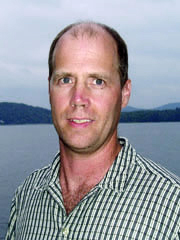David Foster, P.E., Ph.D.
Associate Professor of Geological Sciences
College of Liberal Arts and Sciences
2004 Awardee

Mountain belts, fault zones and continental rifts make up David Foster’s daily vernacular. Foster, an associate professor in the Department of Geological Sciences, studies these geological structures to better understand the development of continents, the generation of mineral resources and the potential for major earthquakes. “My research on ancient deep-seated fault zones helps us understand how rocks deform at great depths beneath modern faults such as the SanAndreas Fault,” Foster says. Foster’s research will not lead directly to earthquake predictions, but may help understand what regions have a greater potential for earthquakes, so they can take precautions and minimize loss. “Foster’s laboratory is one of only a few in the world that have the capability to characterize the thermal history of rocks from 50 to 500 degrees C,” says Paul Mueller, chair of the Department of Geological Sciences. Foster’s research has combined detailed field observations with high-precision radioactive dating measurements. His active projects and research collaborations are in Australia, New Zealand, Namibia and Austria. In Australia and New Zealand, his research on the construction of continental crust and the geometry of fault zones is used for gold exploration. “I enjoy all aspects of research, but the two things I enjoy most are the fieldwork and the challenge of synthesizing large data sets near the end of a project,” Foster says.
 Mountain belts, fault zones and continental rifts make up David Foster’s daily vernacular. Foster, an associate professor in the Department of Geological Sciences, studies these geological structures to better understand the development of continents, the generation of mineral resources and the potential for major earthquakes. “My research on ancient deep-seated fault zones helps us understand how rocks deform at great depths beneath modern faults such as the SanAndreas Fault,” Foster says. Foster’s research will not lead directly to earthquake predictions, but may help understand what regions have a greater potential for earthquakes, so they can take precautions and minimize loss. “Foster’s laboratory is one of only a few in the world that have the capability to characterize the thermal history of rocks from 50 to 500 degrees C,” says Paul Mueller, chair of the Department of Geological Sciences. Foster’s research has combined detailed field observations with high-precision radioactive dating measurements. His active projects and research collaborations are in Australia, New Zealand, Namibia and Austria. In Australia and New Zealand, his research on the construction of continental crust and the geometry of fault zones is used for gold exploration. “I enjoy all aspects of research, but the two things I enjoy most are the fieldwork and the challenge of synthesizing large data sets near the end of a project,” Foster says.
Mountain belts, fault zones and continental rifts make up David Foster’s daily vernacular. Foster, an associate professor in the Department of Geological Sciences, studies these geological structures to better understand the development of continents, the generation of mineral resources and the potential for major earthquakes. “My research on ancient deep-seated fault zones helps us understand how rocks deform at great depths beneath modern faults such as the SanAndreas Fault,” Foster says. Foster’s research will not lead directly to earthquake predictions, but may help understand what regions have a greater potential for earthquakes, so they can take precautions and minimize loss. “Foster’s laboratory is one of only a few in the world that have the capability to characterize the thermal history of rocks from 50 to 500 degrees C,” says Paul Mueller, chair of the Department of Geological Sciences. Foster’s research has combined detailed field observations with high-precision radioactive dating measurements. His active projects and research collaborations are in Australia, New Zealand, Namibia and Austria. In Australia and New Zealand, his research on the construction of continental crust and the geometry of fault zones is used for gold exploration. “I enjoy all aspects of research, but the two things I enjoy most are the fieldwork and the challenge of synthesizing large data sets near the end of a project,” Foster says.

